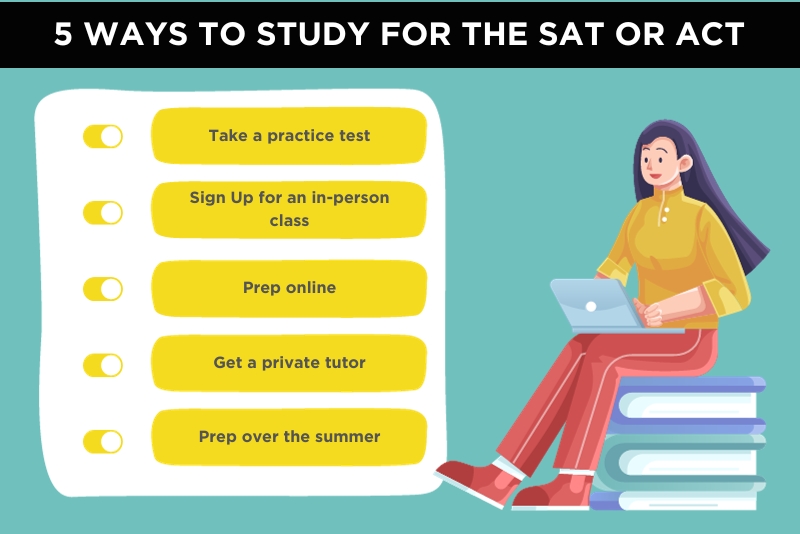
What’s our best tip for mastering this standardized test season? Start early. In fact, we recommend starting your test prep the summer between sophomore and junior year. Most students will then go on to take the SAT or ACT (or both !) once during their junior year and once during the fall of their senior year.
So what kind of test prep is best for you? Take a look at some of the most popular SAT and ACT test prep methods for high school students.
1. Take a Practice Test
What would be your score if you showed up for the test today? To figure out how you’d measure up, take an SAT or ACT practice test under conditions that mimic the real testing environment. (For example: shut off your phone and use a timer.)
Your practice test score is your baseline. You can use your baseline score to help you make a study plan based on what you need to work on. Do you need to build up your vocabulary? Focus on math drills? Tame test day jitters ? Practice tests also familiarize you with the different sections and directions of the test you plan to take so that there are no surprises.
When you take a free practice test with The Princeton Review, you’ll get a detailed score report that analyzes your strengths and weaknesses and gives you an action plan for increasing your score. Follow it up with one of our test prep books to keep practicing right up to test day.
2. Sign up for an In-Person Prep Class
If you find it hard to study on your Saturdays off, you might want to consider a class taught by an instructor who will hold you accountable. Complete with homework and plenty of in-class practice, a prep class will put you through your paces and keep you on track all semester long. Test prep classes can run the gamut from small group settings to larger classrooms taught by test experts or even teachers from your high school if you take a prep course through school. With a little research, you’ll find the environment that’s best for you. And, of course, we’ve got plenty of prep course options .
Read More: Take a Free Practice Test
3. Prep Online
Many courses offer an online component in addition to in-class instruction. But super busy students may find it difficult to schedule a prep class between after-school jobs, volleyball, or violin. Online test prep lets you prep when and where it suits you best, repeat lessons, or skip ahead. This option is best for self-starters who won’t need regular deadlines and face-to-face time with an instructor to keep them motivated.
4. Get a Private Tutor
If you’re looking for a completely personalized approach, consider prepping with an SAT or ACT tutor. One-on-one tutoring sessions ensure you’ll get on-the-spot feedback and customized lessons to your needs and learning style. For example, if you’ve mastered sentence completion but need to work on geometry, your tutor will adjust your prep plan accordingly. This is also the most flexible method in terms of scheduling and great for students with limited availability or fast-approaching deadlines. Our Princeton Review expert tutors will meet you where and when it’s convenient for you.
5. Prep over the Summer
Students who are swamped during the school year can take advantage of their lighter workload in the summer. With an August SAT and a September ACT test date on the horizon, summer is a smart time to focus on the test-taking skills and knowledge areas you need to get a great score. If you’re planning to take the PSAT/NMSQT in the fall, preparing for the SAT is the best way to prepare for the PSAT. Now for a limited time, get our PSAT prep (a $299 value) for free when you enroll in a comprehensive SAT course or tutoring program . Why not start the school year confident that you’re covered?
Build the right SAT prep plan for you
Our private tutors will help you build a prep plan that's customized to your score goals, study habits, and schedule.
Read More
Explore Colleges For You
Connect with our featured colleges to find schools that both match your interests and are looking for students like you.
Get Started on Athletic Scholarships & Recruiting!
Join athletes who were discovered, recruited & often received scholarships after connecting with NCSA's 42,000 strong network of coaches.
Best 390 Colleges
168,000 students rate everything from their professors to their campus social scene.
Explore Colleges For You
Connect with our featured colleges to find schools that both match your interests and are looking for students like you.
Get Started on Athletic Scholarships & Recruiting!
Join athletes who were discovered, recruited & often received scholarships after connecting with NCSA's 42,000 strong network of coaches.
Best 390 Colleges
168,000 students rate everything from their professors to their campus social scene.
Explore Colleges For You
Connect with our featured colleges to find schools that both match your interests and are looking for students like you.
Get Started on Athletic Scholarships & Recruiting!
Join athletes who were discovered, recruited & often received scholarships after connecting with NCSA's 42,000 strong network of coaches.
Best 390 Colleges
168,000 students rate everything from their professors to their campus social scene.



